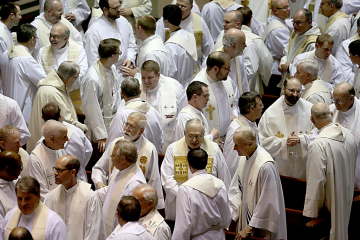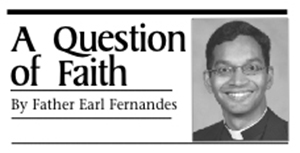Q&A: Do people like Dr. Kermit Gosnell deserve the death penalty?
Dear Father: My faith is challenged. I have heard Church teaching on the death penalty but struggle to believe that some don’t deserve it. Shouldn’t someone like Dr. Kermit Gosnell receive the death penalty?
Dear Reader: Our faith is sometimes challenged in the face of unspeakable crimes against humanity like those perpetrated against women and children, born and unborn, by the late-term abortionist Dr. Kermit Gosnell. The depravity of acts such as those of Ariel Castro, who kidnapped, sexually assaulted three women, and punched one while pregnant causing her to miscarry on five occasions, is repulsive. The brutal murder of Travis Alexander by Jodi Arias, which involved shooting, stabbing, and near decapitation, makes many cringe. If convicted, all three could face the death penalty. Do not such crimes cry out for vengeance? Don’t such individuals deserve death?
Vengeance is mine, says the Lord (cf. Romans 12:9; Deut 32:35). Such crimes can evoke deeply emotional responses in a person, but revenge belongs to the Lord. Church teaching on the death penalty can be found in the Catechism of the Catholic Church (2266-2267) when it addresses legitimate self-defense. Each person has the right to defend his or her own life as love toward oneself is a fundamental principle of morality. However, one may only use that amount of force necessary to repel an unjust aggressor and defend one’s life (Thomas Aquinas, Summa Theologiae II-II, q. 64, art. 7).
There is also the commandment from the Lord to love your neighbor as yourself. We have a duty to defend our neighbors by rendering unjust aggressors — like Kermit Gosnell — unable to cause harm to others. Is it necessary to kill him to defend others? I think not.
While the catechism acknowledges that governments have the right and duty to inflict proportionate punishment to the gravity of the offense (2266), it also recognizes that the primary purpose of punishment is to address the disorder introduced by the offense. Killing Dr. Gosnell will not bring back those women or children. The catechism continues, saying that in addition to defending public order and safety, punishment serves a medicinal purpose — to correct the guilty party. Killing Dr. Gosnell will not or allow for repentance. It may be that his heart is very hard and he will never be converted to the way of the Lord. That is up to God and to him, not us.
While the catechism reaffirms that “the traditional teaching of the church does not exclude recourse to the death penalty, if this is the only possible way of effectively defending human lives against the unjust aggressor”, can one really say that the death penalty is the only possible way to defend from the likes of Kermit Gosnell?
The catechism (2267) continues: “If non-lethal means are sufficient to defend and protect people’s safety from the aggressor, authority will limit itself to such means.” This is more in keeping with human dignity and the common good. In the United States, the conditions under which the death penalty can be legitimately applied, to use the words of Blessed John Paul II, “are very rare if not practically non-existent.”
Kermit Gosnell’s actions are despicable. Women and children were subjected to his butchery and killed. Like you, many are very upset but the words of Paul call out: “If you are angry, let it be without sin. The sun must not go down on your wrath; do not give the devil the space to work on you” (Ephesians 4:26-27). If we advocate for the killing of others, when it is not necessary, would we not be opening the “space” for the Evil One to enter in? What would killing him do to our own character as individuals and as a society?
Jesus demands more from his disciples. He tells us in the Sermon on the Mount: “You have heard it said to you, you shall not kill, but I say to you, anyone who grows angry with his brother shall be liable to judgment” (Matthew 5:21-22). Ours is a demanding faith, with a demanding morality, and an even greater reward.
Editor’s Note: Father Earl Fernandes is dean of Mount St. Mary’s Seminary and the Athenaeum of Ohio, where he is assistant professor of moral theology. To ask Father Fernandes a question about the Catholic faith, send an email to Steve Trosley or mail to The Catholic Telegraph, 100 East Eighth Street, Cincinnati, OH 45202.














